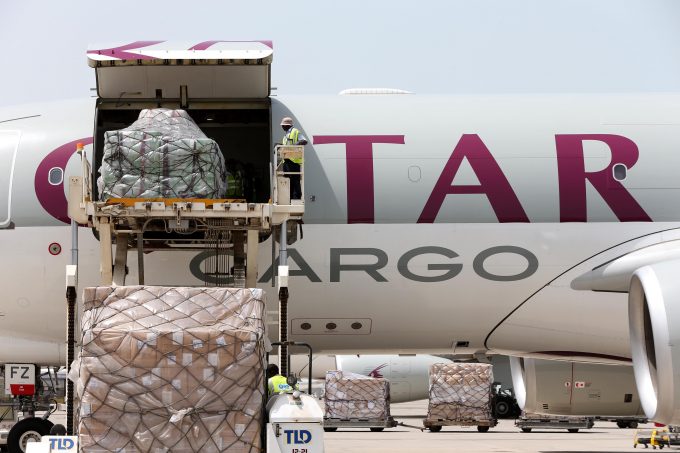Ajay Barolia and Peter Weir new cargo leaders for Swissport in North America
Swissport has appointed Ajay Barolia as its senior vice president cargo and Peter Weir as ...
TFII: SOLID AS USUALMAERSK: WEAKENINGF: FALLING OFF A CLIFFAAPL: 'BOTTLENECK IN MAINLAND CHINA'AAPL: CHINA TRENDSDHL: GROWTH CAPEXR: ANOTHER SOLID DELIVERYMFT: HERE COMES THE FALLDSV: LOOK AT SCHENKER PERFORMANCEUPS: A WAVE OF DOWNGRADES DSV: BARGAIN BINKNX: EARNINGS OUTODFL: RISING AND FALLING AND THEN RISING
TFII: SOLID AS USUALMAERSK: WEAKENINGF: FALLING OFF A CLIFFAAPL: 'BOTTLENECK IN MAINLAND CHINA'AAPL: CHINA TRENDSDHL: GROWTH CAPEXR: ANOTHER SOLID DELIVERYMFT: HERE COMES THE FALLDSV: LOOK AT SCHENKER PERFORMANCEUPS: A WAVE OF DOWNGRADES DSV: BARGAIN BINKNX: EARNINGS OUTODFL: RISING AND FALLING AND THEN RISING

Costs for shipping via Qatar could fall, following an agreement to end the blockade of the country by other Middle Eastern states.
Saudi Arabia, Bahrain, Egypt and the UAE introduced a land, sea and air blockade of Qatar in June 2017, accusing the country of supporting terrorist groups and working with Iran.
Today, a formal agreement is expected to be signed at the GCC meeting in Saudi Arabia, which reportedly led the decision to end the blockade.
The group had called for Qatar to acquiesce to some 13 demands, including closing broadcaster Al Jazeera, but it appears the state has not had to honour any.
Qatar Airways, which claimed the blockade had cost it some $5bn, is said to have agreed to drop lawsuits seeking compensation. However, the airline remained uncharacteristically quiet this morning.
In July, the carrier launched four international investment arbitrations against the UAE, Bahrain, Saudi Arabia and Egypt over the decision to block the airline from their airspace.
Qatar Airways said at the time: “For three decades, Qatar Airways made substantial investments in the four blockading countries in order to serve hundreds of thousands of passengers and to transport tens of thousands of tons of cargo to and from each of these countries annually.”
But the blockade, implemented without warning, “specifically targeted Qatar Airways, with the objective of shuttering Qatar Airways’ local operations, destroying the value of the airline’s investments and causing widespread damage to Qatar Airways’ global network of operations.
“In particular, these measures included, but were not limited to, closing their airspace and airports to Qatar Airways’ aircraft and revoking Qatar Airways’ licences and permits to operate in the blockading states. These measures persist to date and continue to disrupt Qatar Airways’ global operations.”
The ending of the blockade should cut costs for sea, air and land transport companies in Qatar, which have had to find new routes. Qatar reportedly has paid Iran $100m a year to use its airspace, while the airline has had to fork out for additional fuel for the longer flights which avoided banned airspace.
“Qatar Airways will now be able to fly over the Middle East again, saving a binful [of money],” said one forwarder.
The rapprochement is understood to have been driven by Saudi Arabia, which is reportedly keen to position itself as a partner and open to dialogue with the incoming US administration.
Comment on this article